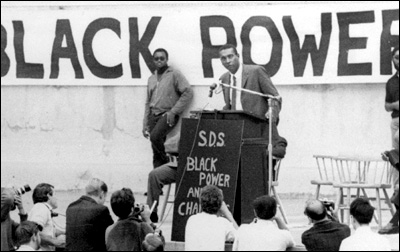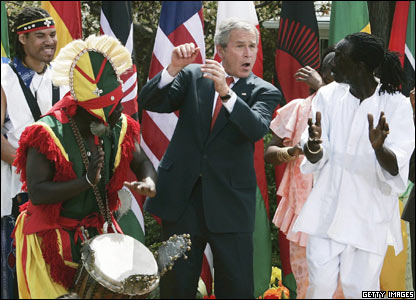
Senator Barack Obama and the State of the Black Union 2008
Tom Joyner Morning Show
Thursday, February 14, 2008
By now many, if not most of you, have either read or heard about the letter faxed to me by Senator
Barack Obama yesterday to officially inform me that he would not be attending the State of the
Black Union symposium next Saturday, February 23, in New Orleans, live on C-SPAN. The letter
was apparently made public on the Internet by the Obama campaign.
This morning a few thoughts now about the letter, about Senator Obama and for that matter, about
Michelle Obama.
First, I want to thank Senator Obama for his letter, although I regret his decision. I said on Tuesday
and I reiterate today, that I believe that this is a critical miscalculation and a missed opportunity.
Having said that, I also feel that should Senator McCain or Governor Huckabee, like Mr. Obama,
end up denying our invitation to appear at this annual Black think tank, it would also be for them as
well, in the long run, a critical miscalculation and a missed opportunity.
Particularly for Senator John McCain, who appears to now be the presumptive Republican nominee
and who decided, as you recall, not to appear last year before Black America in Baltimore.
Indeed, I personally expressed that sentiment to Senator McCain earlier this week. Don’t think that
in the general election, should he be the nominee, that he ain’t going to get reminded frequently that
he kept passing on opportunities to speak to Black and Brown audiences. That’s pretty much
Political Science 101. That’s going to happen, trust me.
Two. For the record, with regard to this letter and the statements made therein, my office was never
contacted by the Obama campaign offering Michelle Obama as a proxy speaker. It never happened.
No letter. No fax. No e-mail. No phone call. No document whatsoever from the Obama camp to
my office, ever, regarding Michelle Obama. She was never offered, it was never discussed.
Three. While I have great admiration and affection for Michelle Obama, had she been offered to us
I would have respectfully declined. Just as we would have declined had Hillary Clinton offered Bill
Clinton; had John McCain offered Cindy McCain; had Mike Huckabee suggested Janet Huckabee.
By any measure, by any measure, Michelle Obama’s personal story is empowering and inspiring. I
am moved by her personal story, as I have been, since I first met her. From the South side of
Chicago to Princeton, to Harvard Law, it is a quintessential American story of overcoming.
That said, last year at Howard, live on PBS, we spoke to candidates only. And that’s what we intend
to do next Saturday, February 23, in New Orleans, live on C-SPAN, speak to candidates only, with
all due respect.
And speaking of Howard, point number four. When we invited Senator Obama last year to
Howard, with all of the other announced Democratic candidates at the time, so many people, so
many people, said publicly, that Tavis is stacking the deck in Obama’s favor. Black college. Black
book. Black audience. Black journalists. Black moderator. “Smiley is stacking the deck for
Obama,” they said.
The Washington Post Editorial Board said that to me to my face. “Aren’t you stacking the deck for
Mr. Obama?” Now, eight months later, another simple invitation, along with all the other
remaining viable candidates, and now he’s being boxed in by me?
Respectfully, that dog just won’t hunt. Because by that logic, at this point in the campaign, any
gathering of Black thought-leaders, opinion-makers and influencers who invite Senator Obama to
appear on stage at a nationally televised event, that invitation --- in and of itself, given that logic ---
would be tantamount to “boxing him in.”
This was simply an invitation, nothing more. There has not been, there is not now, nor will there
be, any effort on my part to snap on the Obama campaign, or the McCain campaign or the
Huckabee campaign, if they choose not to attend. It was just an invitation to him and every other
candidate. Accept or reject. An invitation, nothing more, nothing less.
I’ve lost count now of how many debates the Democrats have had to address other issues that, in
fact, do matter to us. But I can tell you exactly how many times they’ve gathered to specifically
address our issues. There is no comparison.
Point number five. Senator Obama is on a mission. As he suggested in his letter, his mission is to
become the next President of the United States. And I ain’t mad at him. As I’ve said before, and I’ll
say it again, I revel in his historic run for the White House. As a Black man, I celebrate his past
accomplishments. I celebrate his future aspirations.
Respectfully, I knew Barack Obama long before most of us learned to pronounce his name
correctly. So long ago, in fact, that years ago Barack Obama was working with the kids in my
Foundation, speaking to them about leadership development way back when.
I have no personal animus toward Barack Obama.
To quote that great philosopher, George Wallace, “I love him and there ain’t nothing he can do
about it!” That said, I love Black people, too. And I have a vocation. I have a calling. I have a
purpose. And since this ain’t just about me, you have a purpose too. You have a calling, you have a
vocation as well.
And I would hope, this morning, that at the center of our collective calling, is an unconditional love
for Black people. His job right now is to get elected. Our job is to do our part to ensure that
whoever gets elected will be held accountable to the issues that matter most to Black people.
And in that regard, all that I have ever tried to do, with the media platforms, including this one, that
I have been blessed to have access to, is to attempt to speak a love language, to ask critical
questions, to engage in sober assessment and to counsel wise enthusiasm.
If Barack Obama is your candidate, I ain’t mad at you! If Hillary Clinton is your candidate, I ain’t
mad at you! I am not personally in the endorsement business. My small part is to engage in
Socratic questioning. As a Black person, a member of the media, I’ve said many times on this
program, my job is to ask questions, raise issues, address topics, and profile people that otherwise
wouldn’t get that kind of air play.
Now, as the old folk used to say, “I done spoke my piece.”
Senator Clinton has decided to join us. Senator Obama has decided not to. Senator McCain and
Governor Huckabee, we shall see.
But once again, it has never, ever been about them. It has always been about us. We cannot
confuse candidates with the cause. The cause of suffering Black people who are catching hell every
day.
So, I personally; I can only speak for Tavis, I personally have no intention, no interest in discussing
this matter beyond this commentary no matter what’s said about me. Except to promote the
Symposium, which I’ve done every year for almost 10 years now.
I’m told by the folk in the Lt. Governor’s office in Louisiana that it looks like we will have the
largest gathering of volunteers for a single day next Friday on our Day of Service, since Katrina hit
back in 2005. That’s what matters. Loving and serving everyday Black people.
Our conversation next Saturday promises to be spirited, soulful and inspiring.
Finally this morning, as I always say...today, more than ever...love wins. Love wins. Love wins.
Happy Valentine’s Day!
 Before I started college, I didn't give much thought to ethnic differences among peoples of African descent - I simply considered myself black. The fact that my family is from the Caribbean and Latin America never created a feeling of separation within me against my American born brethren and sistren. However, once at school I learned of the divisions and feelings of antipathy between what we at Amherst call the plain ole' blacks (African-American descendants of West African slaves), Africans and Afro-Caribbeans. These kinds of divisions are not only harmful but diverts our concentration from the "real enemy" to our people - systemic institutionalized racism.
Before I started college, I didn't give much thought to ethnic differences among peoples of African descent - I simply considered myself black. The fact that my family is from the Caribbean and Latin America never created a feeling of separation within me against my American born brethren and sistren. However, once at school I learned of the divisions and feelings of antipathy between what we at Amherst call the plain ole' blacks (African-American descendants of West African slaves), Africans and Afro-Caribbeans. These kinds of divisions are not only harmful but diverts our concentration from the "real enemy" to our people - systemic institutionalized racism.









